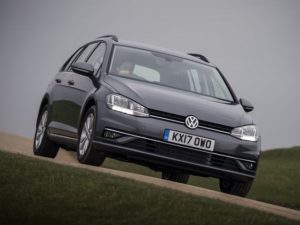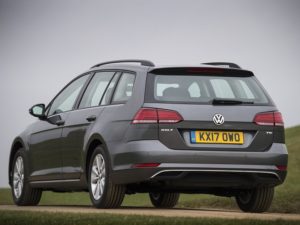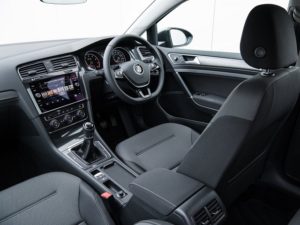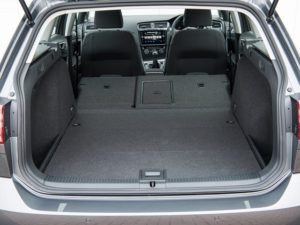Road Test: Volkswagen Golf Estate 1.6 TDI SE Navigation
The Golf still feels like a great solution to the challenges of work and home life, reckons Alex Grant.
SECTOR: Lower Medium PRICE: £23,580 FUEL: 68.9mpg CO2: 106g/km

Volkswagen Golf Estate
Few Volkswagen employees would want to re-live the last few years, but its performance of late shows just how strong the brand is in the UK. Registrations were steady at 208,462 cars last year, in a market down 5.7%, and the newly updated Golf overtook arch rival the Ford Focus to become the country’s second biggest-selling model, with 74,605 registrations.
A staple part of the UK motoring diet, it’s become a range with incredible breadth, spanning 113 variants including electric and plug-in hybrid models, performance versions as well as the Alltrack soft-roader, which means it can cater for a wide spectrum of fleet customers. But SE Navigation, tested here, remains by far the most popular overall and – no doubt steered by job-need users – 42% of Golf Estates are ordered in this trim level.

Volkswagen Golf Estate
Last year’s update was a subtle evolution of the car that’s been offered since 2012, and not all of the major changes can be found at this level of the range. SE Navigation includes all-LED rear lights, but not the sweeping indicators of higher-spec models, for example, while the cabin is solidly built if a little drab.
But it is sensibly equipped for business users; front and rear parking sensors, automatic lights and wipers, and adaptive cruise control are all standard fit. Volkswagen has also included Android Auto and Apple CarPlay as an alternative to Bluetooth hands-free, and the new internet-connected infotainment system is both intuitive and responsive to use. The ingredients for a frustration-free life on the road.

Volkswagen Golf Estate
It’s also incredibly spacious – almost enough to question the need for a £4,000 price jump to opt for the equivalent Passat Estate. The Golf is over 300mm shorter end to end, but can still take 1.8-metre loads with the rear bench folded flat (compared to just over two metres in the Passat) and over a metre in the boot alone (just 117mm less than the Passat). Boot capacity is fairly similar; 605 litres, rising to 1,620mm with the seats folded, versus 650 and 1,780 litres respectively in its significantly larger sibling.
Plus, arguably, the entry-level diesel engine is a better fit in the Golf than it is in the Passat. There’s a good spread of torque to avoid it feeling overworked, even with a full boot, barely any vibration through the cabin and only a dull whirr when under load. While it only gets five gears in the Golf, it’s ticking along at low enough revs to easily return over 60mpg while cruising. A seven-speed DSG automatic is also available as a £1,415 option – it’s more efficient on paper and, with a couple more ratios, could well eke a few more miles out of a gallon on the road too.

Volkswagen Golf Estate
All in all, it’s hardly surprisingly to see that the Golf has weathered the recent spell of bad news for its parent company. With versions to suit most business and personal needs, big-car comforts and genuinely efficient engines, there are plenty of reasons to stick with one of the UK’s most familiar nameplates. It seems British customers are only too aware of that.
What We Think:
The Golf Estate has almost all the functionality of a much larger load-carrier, lacking only a two-metre load length with the rear bench folded. Sensible spec, solid build quality and effortless frugality add up to a brilliant business tool.

















